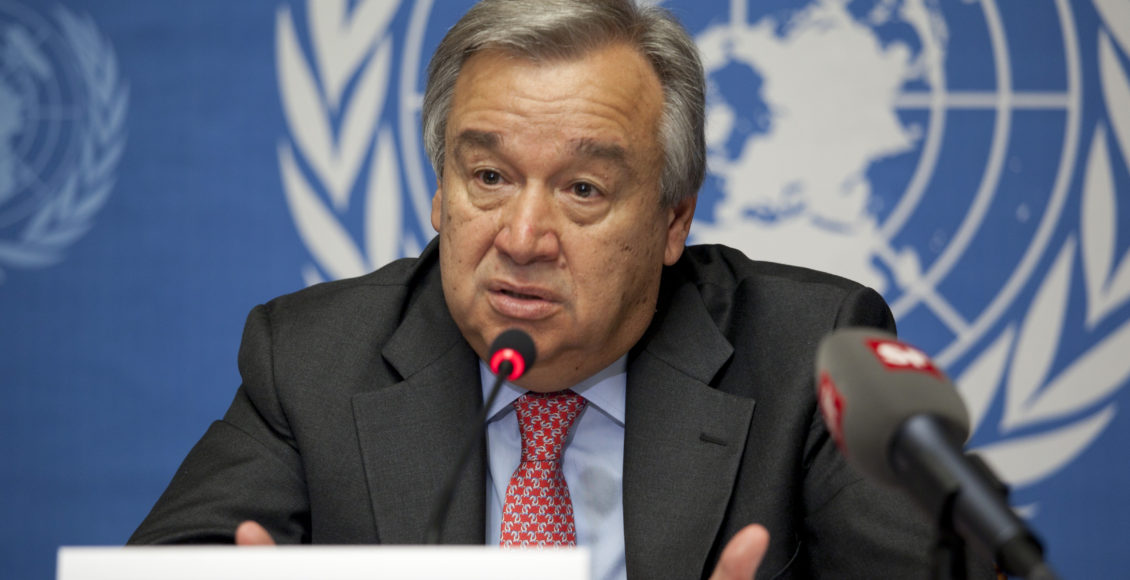Carrot-and-Stick Climate Politics
 retrieved from: https://commons.wikimedia.org/wiki/File:Ant%C3%B3nio_Guterres_2012.jpg
retrieved from: https://commons.wikimedia.org/wiki/File:Ant%C3%B3nio_Guterres_2012.jpg
The month of September was filled with innumerable calls for systemic reorganization regarding climate change and its largely irreversible ramifications. Indeed, Canadians and non-Canadians alike were awestruck at the sight of hundreds of thousands of people, including Swedish environmental activist Greta Thunberg, marching through the streets of Montreal in efforts to bring global awareness to the degradation of the environment. The issue of climate change is also certain to pose challenges to the parties vying for leadership in the nearing Canadian federal election. Nevertheless, the United Nations’ recent undertakings in the UN Climate Action Summit in New York deserve the undivided attention of climate activists due to its unprecedented hardline stance on some leading countries in coal production.
The UN Climate Action Summit sought to advance climate action on a number of issues, notably by preventing the mean global temperature from rising greater than 1.5 degrees above pre-industrial levels primarily through the reduction of greenhouse gas emissions. At the Summit, the Secretary-general of the UN, His Excellency António Guterres, took a tough stance against the leading coal-supporting nations at the UN Climate Action Summit by blocking them from speaking at the conference. Guterres firmly believes that climate change is an emergency; while he has praised the ‘fantastic leadership’ of young activists in bringing the issue to the forefront of international affairs, he has also expressed sorrow over the various failures of governments to honour the 2015 Paris Agreement. As such, Guterres says that he is counting on public pressure to compel such governments to make stronger commitments in fighting the climate change ‘emergency’. Blocking lead coal-supporting countries from speaking at the summit seems to be a form of the aforementioned public pressure. As such , the UN only allowed cooperative countries such as the United Kingdom and France to speak at the event since they were willing to announce “ambitious new carbon-cutting targets, or assisting developing countries fight climate change.”
Guterres has demanded that countries attending the summit stop the construction of “new coal power stations, reduce fossil fuel subsidies, and commit to net zero emissions by 2050.” Yet, these demands have largely gone unfulfilled due to “geo[political] dynamics and resistance against climate action in some countries.” Countries committed to building new coal power stations, such as Japan and South Africa, were not permitted to take the stage and neither was the United States, which has made its intentions clear regarding its withdrawal from the Paris Climate Agreement. Moreover, countries such as Brazil and Saudi Arabia, which have also criticised the climate pact, were excluded. Although this unprecedented step does signify a considerably greater commitment towards tackling climate change by taking a hardline stance against the whims of leading countries, its effectiveness is nevertheless questionable.

While the UN’s move has been praised by various environmental groups, it did not evade controversy. The issue of coal production and consumption is a pivotal one. It was quite surprising that leaders of some of the largest contributors to global air pollution, which is responsible for the deaths of millions annually, were allowed to speak at the summit, yet key players like the United States and Australia were not. Perhaps these countries were invited to fill the void left by non-participating countries. The hypocrisy of allowing coal-loving countries such as China and India, the world’s two largest builders of new coal stations, to speak at the summit ultimately means that the initial cause for which Guterres had propounded suffered a definite blow. Both China and India are under considerable pressure to adopt more ambitious targets for tackling climate change. Yet, they offered “either nothing or very little about their commitments to curb emissions” at the Climate Action Summit.
Given the outcomes of the UN Climate Action Summit, the tactic of blocking several major countries from the world stage was not necessarily effective. A different kind of leadership is required from the major economies of the world in order to effectively fight climate change. Despite the UN’s efforts to publicly shame countries that have historically disavowed and continue to disavow the UN’s environmental commitments, the UN should not allow some of the largest contributors to climate change to escape blame so easily. Compared to the activists who had built momentum for the movement in the streets, the UN failed to achieve any significant traction as the countries responsible for the largest portion of emissions did not express a fervent desire to sign on tougher climate targets.

The UN Secretary-General hoped that the Climate Action Summit would procure big commitments to fighting climate change. Nevertheless, all hope was not lost. The Summit did lead to some new substantial announcements of efforts to tackle climate change, some of which included large amounts of financial aid to developing countries and aggressive commitments from the most vulnerable countries, like island nations in danger of losing land to rising sea-levels. However, there was optimism that at least China and India would announce aggressive actions and become exemplars for other countries weighing their respective prospects of curbing emissions. Instead, both countries used their three minute slots to call for more money from other countries in their efforts to mitigate climate change.
Amina Mohammed, the UN Deputy Secretary-General, proclaimed ahead of the Summit that, “only the boldest and most transformative actions [will] make the stage.” Indeed, this sentiment is shared by the majority of climate activists. The unprecedented move by Guterres was a bold one, yet its approach was defective. Certain countries cannot be held accountable while others are let of the hook despite the fact that they are responsible for the very same enterprises that contribute to climate change – this ultimately defeats the purpose of any system of punishments and rewards.
Edited by Natalie Gastevich.
